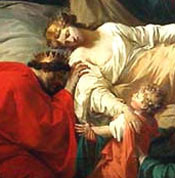
17 Dec 2007
GLUCK: Alceste
Alceste: Tragédie opéra in three acts.
Mozart and Salieri, an opera in one act consisting of two scenes.
Nicolai Rimsky-Korsakov (1844-1908), composer. Libretto derived from Alexander Puskhin's play of the same name.
First performance: 7 December 1898 in Moscow.
Ariadne auf Naxos, Oper with a prologue and one act. Music composed by Richard Strauss. Libretto by Hugo von Hofmannsthal.
La Vestale, a tragédie lyrique in three acts.
Boris Godunov, an opera in four acts with prologue
Modest Mussorgsky, composer. Libretto by the composer, based on Alexander Pushkin's drama Boris Godunov and Nikolai Karamazin's History of the Russian Empire
First performance: 8 February 1874 at the Mariinsky Theatre, St. Petersburg
Il Trovatore, dramma in four parts.
Only a few months following the premiere of Der Rosenkavalier, Hugo von Hofmannsthal proposed a new opera to Richard Strauss based on Molière’s comedy-ballet, Le Bourgeois gentilhomme (in German, Der Bürger als Edelmann).
Die Entführung aus dem Serail, Singspiel in 3 Acts.
Music composed by Wolfgang Amadeus Mozart (1756–1791). Libretto by Johann Gottlieb Stephanie the Younger, based on an earlier libretto by
Christoph Friedrich Bretzner.
Die Entführung aus dem Serail, Singspiel in 3 Acts.
Music composed by Wolfgang Amadeus Mozart (1756–1791). Libretto by Johann Gottlieb Stephanie the Younger, based on an earlier libretto by
Christoph Friedrich Bretzner.
Arabella: Lyrische Komödie in three acts
Die Entführung aus dem Serail, Singspiel in 3 Acts.
Music composed by Wolfgang Amadeus Mozart (1756–1791). Libretto by Johann Gottlieb Stephanie the Younger, based on an earlier libretto by
Christoph Friedrich Bretzner.
La Gioconda, dramma lirico in four acts.
Music composed by Amilcare Ponchielli (1834–1886). Libretto by Arrigo Boito (under the pseudonym Tobia Gorrio), based upon Victor Hugo's Angelo, Tyrant of Padua (1835).
Don Carlo, an opera in four acts. Music composed by Giuseppe Verdi (1813–1901). Libretto by Joseph Méry and Camille Du Locle after Friedrich von Schiller’s dramatic poem Don Carlos, Infant von Spanien. Revised version in four acts (French text revised by Du Locle, Italian translation by Achille de Lauzières and Angelo Zanardini).
Un ballo in maschera, a melodramma in three acts.
Music composed by Giuseppe Verdi. Libretto by Antonio Somma, based upon the work of Eugène Scribe Gustave III ou Le bal masqué (1833)
Medea: Melodramma tragico in three acts.
Die Tote Stadt, an opera in three acts.
Music composed by Erich Wolfgang Korngold (1897-1957). Libretto by Paul Schott (Julius and E. W. Korngold) after the novel Bruges la morte by Georges Rodenbach.
Some Details concerning the Revolution inaugurated by Rossini
Manon Lescaut, dramma lirico in quattro atti
Elektra: Tragedy in one act.
Lyric Opera of Chicago has announced both schedules and cast-lists for is Spring 2020 performances of Richard Wagner’s Ring Cycle. Given the series of individual productions already staged by the company since Fall 2016, that pave the way for the complete cycle, Lyric Opera of Chicago’s complete production should affirm the artistic might of the great composer.
“Diacono himself does not know what musical talent he possesses” – Mascagni

Alceste: Tragédie opéra in three acts.
Streaming Audio
Music composed by Christoph Willibald Gluck. Libretto by Marie François Louis Gand Leblanc Roullet after Calzabigi.
First Performance (French version): 23 April 1776, Académie Royale de Musique, Paris
| Principal Characters: | |
| Alceste [Alcestis] Queen of Thessaly | Soprano |
| Admète [Admetus] her husband | Tenor |
| Their two children | Silent |
| Evandre [Evander] leader of the Pherae people | Tenor |
| A Herald of Arms | Bass |
| High Priest of Apollo | Bass |
| Apollo protector of the house of Admetus | Baritone |
| Hercule [Hercules] | Bass |
| Oracle | Bass |
| Thanatos an infernal deity | Bass |
Setting: Classical Pherae, Thessaly
Synopsis:
Act I
A herald announces to the people of Thessaly that King Admeto is gravely ill and that there is little hope. Evandro calls upon all to pray to the oracle at the temple of Apollo. Alceste joins them and asks Apollo for pity. The oracle says Admeto can be rescued if another voluntarily sacrifices his life. This causes great consternation. Alone, Alceste agonizes whether to give her life for that of her husband.
Act II
In a dense forest dedicated to the gods of the underworld, Ismene asks Alceste why she is leaving her husband and children. Alceste tells Ismene of her intentions. Meanwhile, Admeto has a miraculous recovery to the joy of all Thessaly. Evandro tells him that someone has apparently sacrificed himself for the king. When Alceste appears, he questions her until she confesses. The desperate king hurries into the temple to plead with the gods. However, Alceste says good-bye to the children.
Act III
The decision of the gods is not revoked. The people lament the approaching death of Alceste. Having said good-bye to Alceste, Admeto decides to follow her into death. Then the heavens open, Apollo descends and proclaims that the gods have given them their lives as a reward for their steadfast love.
Click here for the complete libretto.